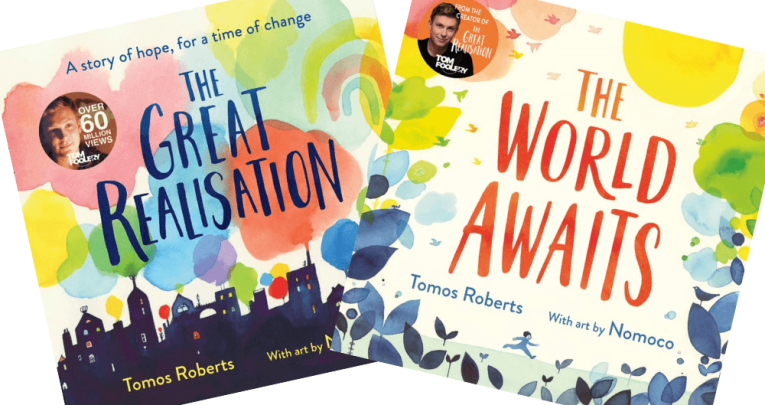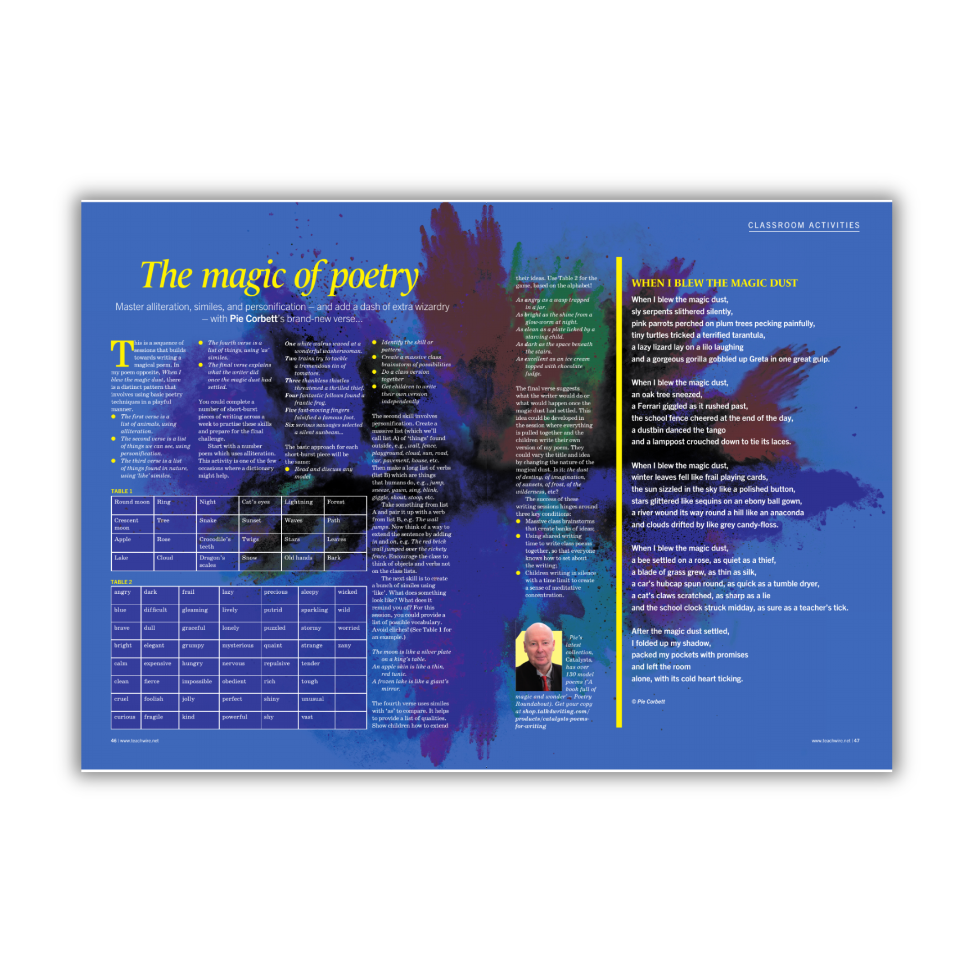Writing poetry KS2 – Tomos Roberts on teaching poems for kids

Poetry can seem old-fashioned and elitist, but when children write about what really matters to them, it can be magical, says Tomos Roberts

The Great Realisation is a bedtime story of hope for a time of change. I am grateful to Teach Primary for asking me to delve into some of the ideas contained within the story and to consider the effect poetry can have on the developing minds of young children. I’ll do my best.
Writing The Great Realisation was a challenge I set for myself. The challenge being, if there was a hopeful message to be found amidst a global pandemic, then it was worth finding.
The Great Realisation poem
Since its release and subsequent attention, the poem has crossed so many borders, from New Zealand to New York, Peru to the Philippines, Lebanon to London.
People from all over the planet wrote to me, sharing their common desire to feel hopeful. That said, one of the most humbling aspects has been the response of children from across the world who are eager to respond to these hopeful ideas.
I have been moved by their responses and am so glad that a poem has led to so many conversations between parents and children. Many of the concepts in the poem are things I wanted to know so much more about at a young age and so I am filled with optimism and belief that the next generation might grow up in a more enlightened world.
Since The Great Realisation, I have done many creative writing workshops with children over Zoom, of both primary and secondary age, and I always begin with the proposition that a poem is an attempt to solve a problem.
I didn’t always think about poetry in this way, but a wise university lecturer suggested it once and since then I’ve never been able to shake it from my mind. Thinking about a poem as an attempt to solve a problem can also help clear up one of the great stumbling block questions for someone aspiring to write one.
Often my little brother or sister, Cai and Sora (who are eight years old at the time of writing this) will ask me, “What shall I write a poem about?” It’s a good question. A difficult question.
Because there are billions, if not infinite things you could write a poem about. So, what if I ask you this question instead: What problem would you most like to solve? What is bothering you right now? What would you like to fix? What are you grateful for?
Suddenly, we have more ideas. Suddenly the poem has stopped being so ethereal and become way more accessible and tangible. A poem, after all, can be anything you want it to be.
It can be an epic, earth shattering, world-building, mammoth like John Milton’s Paradise Lost. Or, it can be a well woven, delicately balanced, contemplation on love like Shakespeare’s Sonnet 18.
Or, it can be a quaint, neat, dainty and distilled reflection on the beauty of a moment like Matsuo Bashōhaiku’s, The Old Pond.
The point I mean to make is, I don’t think it makes any sense at all to start by thinking about the poem. A ‘poem’ is just a vehicle for a thought.
A vessel for whatever it is you want to say. So, what do you want to say? What it on your mind? That’s what we need to know. What is the problem? Forget about the form, start with the message.
Solving problems
One thing I always try to make clear when I say this, is I don’t mean ‘problem’ in the classically negative sense. A problem, in my view, can be good or bad.
Falling in love. There’s a real problem. It’s a problem because it’s complicated. What do you do when you fall in love with someone? What are you supposed to say? How are you supposed to act? What if they don’t feel the same way?
This is why you could fill football stadiums with the amount of poetry dedicated to the solving of this very problem. Because we all yearn to learn more, to know more, to examine every nuance of this problem and hopefully prepare ourselves more for when this manifests in our own life and comes knocking on our door.
These problems can also seem benign or simple and often not feel like problems at all.
I remember in one class I did in a school in Wolverhampton, a little boy put his hand up and said, “I like writing descriptive poems about how my garden looks in the morning, after it has rained. I don’t think I’m solving a problem when I do that.”
I told him that I think he is. I think he is solving the problem of how to capture the beauty of nature within in language.
You could say, “This is a garden”. Great. Does the job. But it doesn’t tell me much. It doesn’t evoke any emotional response within me, though on the surface it is perfectly true.
But what about the colours, the smells, the taste of the air, the way the light hits the raindrops and refracts into scattered rainbows, the millions of tiny life forms, scrambling, bumbling, wriggling and foraging away about their day in that garden.
Human beings have a deep affinity for beauty. It is the difference between a cathedral and a carpark. Both are buildings, though I have never seen tourists queueing up with cameras to wander about while gazing longingly at a carpark.
So perhaps he was solving an important problem for us after all.
Poems for kids
But how does all of this relate to children? If you are thinking that, then I can hardly blame you. I think it relates to children because they are new, uncorrupted and unspoiled.
They have a great eye for spotting the problems. I once took my little sister Sora to see the London Eye, and as we were walking under a bridge in Waterloo, she spotted a homeless man. She turned to me and said, “Tom, why can nobody see him?”
The question gave me goosebumps. From her six-year-old perspective, people were walking past this man whose life was in crisis without stopping, helping or even looking, and the only explanation was that they couldn’t see him.
Many of us adults have, through necessity, grown hard to some of the problems of the world, often for lack of a solution, but children have a natural empathy that we can learn so much from.
When I wrote The Great Realisation, I asked Cai and Sora, “What problems do you think there were in the world before this virus came along?”
My little sister was very concerned about plastic in the oceans. My little brother was concerned about, as he put it, “some people have lots and lots of money and others have none at all.”
I myself was concerned with tobacco, alcohol and gambling lobbies after a book on power and influence I had just read. We used these problems as the scaffold for our story.
I guess my hope is that poetry can be demystified for children. I don’t want it to seem like an elitist art form that they only know about from archaic mid-century thinkers, spoken in language no longer used.
Poetry can be like that, and I am grateful that it was. But what it could be, is millions of adults and children alike, articulating themselves, and finding the words that can reduce any problem, any obstacle to a collection of well-chosen words.
By doing that, I believe we all benefit, as we are able to think, communicate and grow together. That is the kind of poetry I want to read.
Tomos Roberts is a spoken-word poet and filmmaker. His new book, The World Awaits (£6.99, Farshore) is out now. Browse more ideas and resources for teaching KS2 poems.











